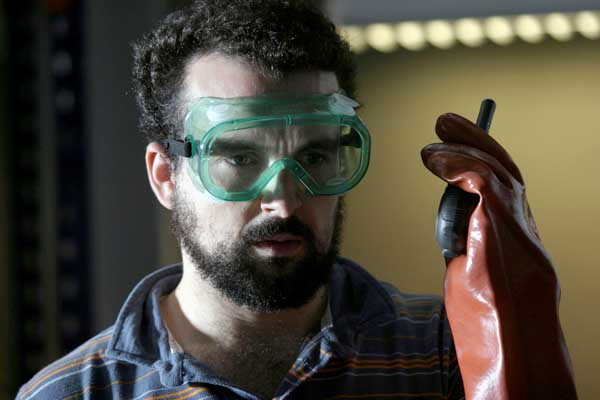|
Reviews of Recent Independent, Foreign, & Documentary Films in Theaters and DVD/Home Video

TIME CRIMES Prepare for one of the most convoluted mind trips of the year in the debut feature from Spanish director Nacho Vigalondo. TimeCrimes was an official selection at several prestigious festivals this year, including Sundance and the San Francisco International, but unfortunately, this resonant Spanish-language gem will probably go largely undetected in theaters. I see a cult classic in the making. Karra Elejalde plays Hector Dos (as he eventually refers to himself). While exploring peculiar goings-on in the forest behind his and his wife’s new home, he is chased by a mysterious masked man and, seeking safety, stumbles upon a secret lab with an experimental time travel chamber. A technician (played by the director) offers him refuge in the contraption, and before he knows it, Hector Dos travels back an hour and a half in time, setting in motion a fatalistic series of events. After an explanation from the scientist, some of the pieces start to come together, and the technician warns Hector Dos of the dangers of messing with the reality of time. In other words, Hector Dos must not interfere with the other, earlier reflection of himself, Hector Uno—but the confused man’s anxiety gets the best of him. Already in this initial complication we have a poignant glimpse of human nature. No matter that Hector Uno is physically and metaphysically the same man as his counterpart, he is a rival. Hector Dos ominously goes to settle the matter, clinging like a child to the devices of technology (binoculars, a walkie-talkie) that ultimately deceive and betray him. If this isn’t allegory, I don’t know what is. And it’s funny. Vigalondo and the talented Elejalde have definitely studied up on sci-fi camp. They seem to revel in sustaining the ridiculous moments for as long as the plot will allow. Hector Dos wraps his head in bandages like a B-movie mummy, and his foreknowledge of the other Hector’s movements allows him to hilariously time his reactions. The technician earns some laughs as a pathetic stooge, but on second thought, perhaps he’s no stooge. Each new manifestation of his play-dumb persona is followed by a new revelation. Eventually, the humor subside as the allegory sharpens. The Hectors find themselves caught in a seemingly unstoppable cycle of violence as each attempts to destroy the previous one, causing endless collateral damage and threatening innocent lives in the process. Nothing seems to break the cycle. But then again, nothing seems to matter to each Hector except his own self-preservation. To break this cycle of reciprocated
violence, perhaps Vigalondo is offering the notion of questioning the
reality that creates it. Where does reality come from? It comes mainly
from our individual choices, but Hector Dos submits to a pattern that he
and Hector Uno have created in the first place. At the end, several
steps removed from his original choices, he’s unable to recognize them
as his own. Without self-reflection, the Hectors are no doubt doomed to
repeat it. Michael Lee
|

